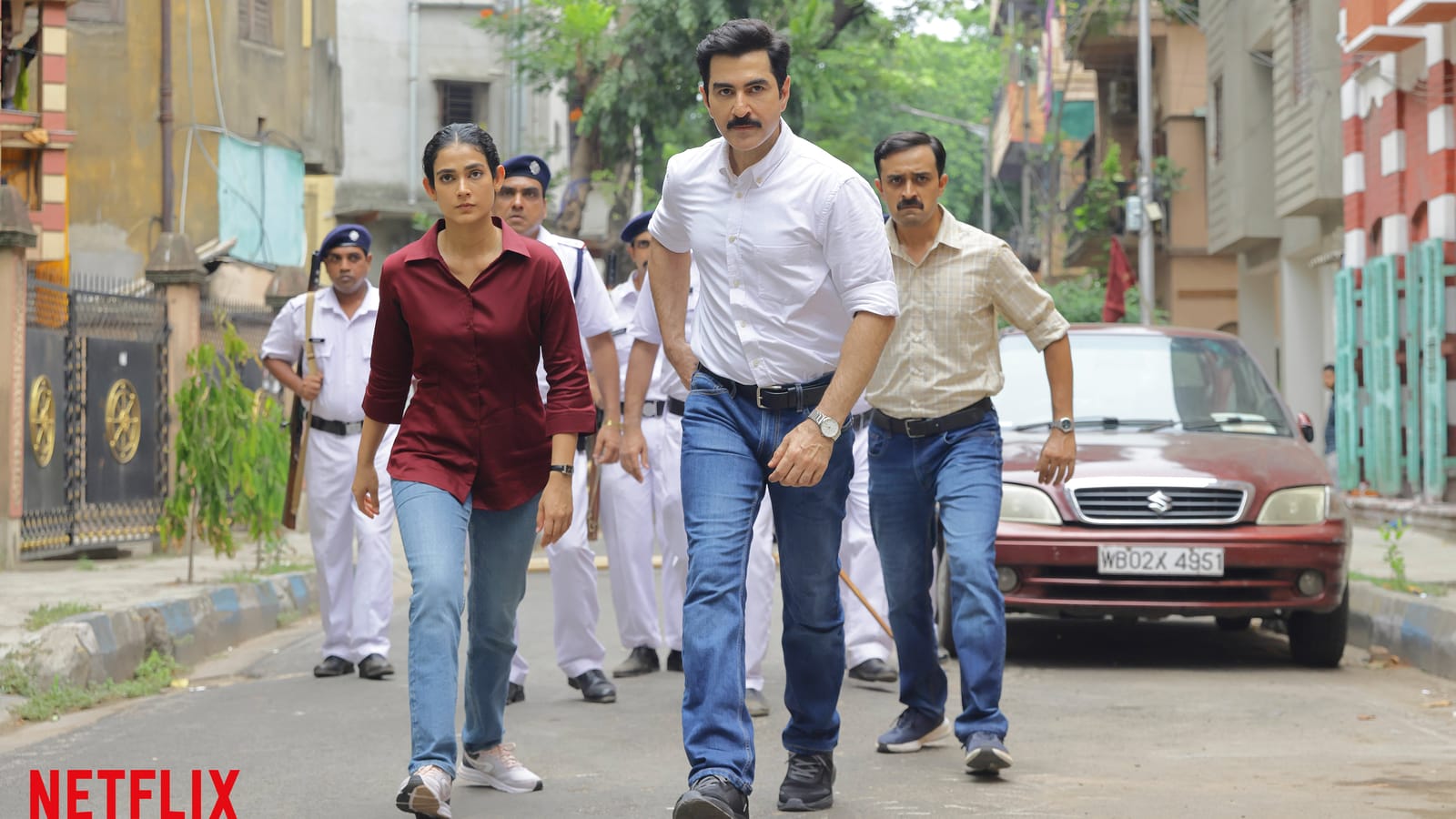Khakee: The Bengal Chapter basks in the glory of West Bengal’s political yesteryear, fictionalising the years of Left governance and how it paved way for the subsequent government. The prequel, set in Bihar, made its way into the hearts of netizens due to its representation of ethical dilemmas abound in the police force.
The prequel, set in Bihar, made its way into the hearts of netizens due to its representation of ethical dilemmas abound in the police force.
The sequel, however, trying to woo mainland India, centred the State as majorly Hindi-speaking, reckoning it would strike a chord with the audience. Set in the late 90’s and early 00’s, the sequel invisibilised women’s participation in the formal sector, and women have being represented as merely household workers, sparingly present in the formal labour force, with no actual thought given to their character-formation, let alone a story-line that does not tie them to a male-figure.
Neglect within the household in Khakee
The supporting women characters in Khakee are seen within the private quarters of their home, not daring to step out, and when they do try, are rebuked. This reminds one of Tagore’s Ghare Baire which holds a candle to women’s emancipation in Bengal and how Indian nationalism would benefit from mutual contribution. Bagha (played by Saswata) is a renowned gangster who intends to go into hiding.
While the women of his household help to gather the necessities in Khakee, they stop at the threshold, making sure to not cross it. When the woman of the household shows her “care” by placing a shoe at his feet, Bagha defends the rituals mandated by the scriptures, rebuking her. This places one at the juncture of tradition and modernity: the woman willing to negate the institutionalised patriarchy, that limited one within the inner quarters of a household. It was the same physical structure that portrayed their women, emoting, always.
Whether it was Agarwal’s (a businessman who was killed by gangsters) daughter, or his wife, or the women of Bagha’s household, who were beating their chests following the death of his mother, the women were seen navigating their emotional states. This also reinforces the harmful stereotype of women being “more emotional”, while men seem to have it under control in Khakee.
The legitimation of women being “more emotional” not only harms their credibility but masks their aptitude of being rational with decision-making, since emotions and rationality lay dichotomous to each other. Deepa is seen to exit her household premise, only when she has to pander to a male figure. The one time she expresses her autonomy, trying to placate a sexual assault survivor, against the wishes of her husband, is when death came knocking at her door.
The one time she expresses her autonomy, trying to placate a sexual assault survivor, against the wishes of her husband, is when death came knocking at her door.
The death is symbolic of silencing women’s voices given that it was instrumented by the assaulter. Deepa’s unanticipated death set her husband into a fit of rage, committing numerous murders throughout the city. The instance can be juxtaposed to the scenes that have shown women emoting, with their male counterparts, staying resolute.
The politics of cooking
Deepa is often seen serving food, at times to her husband, or to his friends in Khakee. The practice of only situating women as household cooks, denigrates their identity that could’ve been centred around other things. Deepa’s insistence on taking care of Sagor’s gastronomical needs puts her in a cycle of oppression where she is held responsible to feed others. Having Sagor’s friends have a taste of the mutton she had cooked, reinforces the idea that women of the house are relegated to household chores (read: cooking and serving).
Deepa’s character arc in Khakee had been cut off, as soon as it began to unfurl. Saptarshi’s wife, although pregnant, seems to care about his food intake, caressing a cop who’s in a hurry to investigate an anonymous tip. Women have always had an oppressive relationship with food, since the labour that goes into the preparation is invisibilised. The kitchen, a place secluded from the living quarters, reminds one of the exclusion of women, from the matters of the household, and society in general, given that women spend approximately 200 minutes in the drudgery of regular food preparation.
A tale of the political succession in Khakee
Nibedita Basak, played by Chitrangada Singh, seems to have been cast to offer a token representation of the succeeding electoral heavyweight in West Bengal. Beyond shallow narratives of resistance, her character has been portrayed in Khakee as passive with an “unnecessary” love interest that seemingly coincides with her political career.
Focussing on her “love interest” as a major portion of her political career, the series dilutes the power of women’s ability to overthrow governments and how they have been at the forefront of major political movements. Dissemination of tear-gas during their protest had Nibedita shielded in the arms of her “love interest”, evoking a picture of a “damsel in distress” and helplessness in the face of adversities.
The ruthless “male” politicians seem to hold no guilt for their wrongdoings but Nibedita’s conscious volition of engaging in misuse of her power, brings to light a dialogue between Arjun Singh (played by Madnani) and herself, where she confesses to her misdeeds but is given an acquittal since she happened to represent the “lesser evil”. This intensified the belief that women cannot be the perpetrator given their innate emotional quotient.









Deepa was not Sagor’s wife. Manjula was. Manik and Deepa were siblings who were dear to Manjula and therefore were “brother and sister” to them.
And who is Satyaki? It was IPS Saptarshi’s wife who was pregnant. Please get the characters right!